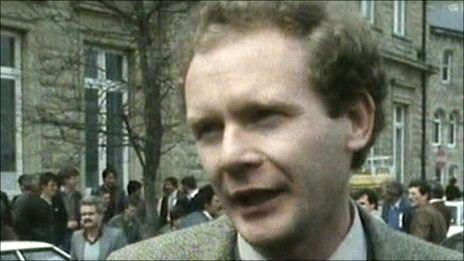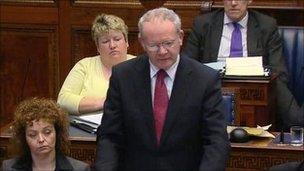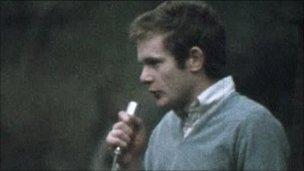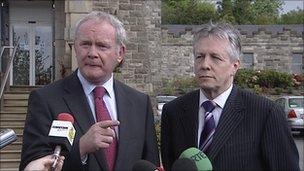Martin McGuinness - a profile
- Published

Mr McGuinness says he made the transition to politics in the mid-1970s
Martin McGuinness is the personification of republicanism's transition from violent paramilitarism to constitutional politics.
Once a Provisional IRA commander, he is now standing for election to the Irish presidency.
BBC News Online looks back at his journey.
The Bloody Sunday Tribunal was the most meticulous public inquiry ever undertaken by the British state.
Its role was to examine the circumstances leading to the shooting dead of 13 unarmed protestors by paratroopers in Londonderry on January 30 1972.
It took years to investigate what happened, compiling many thousands of pages of documentation and cross-examining hundreds of witnesses.
One of those witnesses was Martin McGuinness.
Despite only being in his early 20s in 1972, he was called before the tribunal because it was widely believed that by then he had already risen high in the ranks of the Provisional IRA in his native city.
Sitting in the witness box in Derry's Guildhall, Mr McGuinness did not deny his involvement. He admitted that he had been a member but emphasised that he had left two years later in 1974.
His concession was not a shock as his role in the early 1970s had already been well-documented in the media by that time.
'Strategic vision'
During ceasefire negotiations with the British government in 1972, he was one of a handful of republican leaders who were flown to London for talks with the British Home Secretary, William Whitelaw.

Martin McGuinness has pointed to his track record as deputy first minister at Stormont
Despite his relative youth, he impressed the security services who described him as officer-material with significant strategic vision.
That sense of the wider picture has come to the fore in his current incarnation as a Sinn Fein politician.
When in 1986 his party made its historic decision to end abstention from the Dublin parliament, Mr McGuinness' role was key.
He made an impassioned speech, telling delegates that, in return, the party leadership would lead them to the promised land of an all-Ireland republic.
He has been just as integral in every other landmark decision taken by the republican movement in the 25 years since.
From the first IRA ceasefire in 1994 to the signing of the Good Friday Agreement in 1998, from the decommissioning of weapons in 2005 to power-sharing with the DUP two years later, Mr McGuinness has become, even more than party president Gerry Adams, the public face of Sinn Fein's evolution.
Alternative to violence
First elected as an abstentionist member of the Stormont Assembly in 1982, Mr McGuinness own electoral base was secured with election as an MP for Mid-Ulster in 1997 and MLA for the same constituency a year later.
His own narrative is that he had spent the past two decades exclusively working to build that base and the wider electoral strength of Sinn Fein which, eventually saw them surpass the SDLP as the biggest nationalist party in Northern Ireland, and allowed republican leaders to point to an alternative to IRA violence.
However, a darker version of Mr McGuinness' activities after he claimed to have left the IRA also exists.
In 1993, a Central television documentary said that in 1986 he had been present at the interrogation of Frank Hegarty, an IRA informer who was later found shot in the back of the head.
It also reported that Mr McGuinness had spoken to Mr Hegarty's mother and told her that her son could return to Derry without fear of being harmed.
Mr McGuinness has denied all the allegations.
He has also dismissed suggestions that throughout the 1980s he was a leading member of the IRA, a time when the organisation was responsible for hundreds of murders including the Enniskillen bombing in 1987.
Eleven people were murdered while attending a Remembrance Day ceremony, prompting revulsion on both sides of the Irish border and around the world.
The security journalist Peter Taylor, who has documented the activities of the IRA over four decades, has said the attack was approved by the IRA's Northern Command.

Martin McGuinness was a youthful leader of the IRA in Derry in the 1970s
He added that security sources on both sides of the border had told him that Mr McGuinness was a leading member of the IRA's Northern Command at that time.
Mr McGuinness has denied being a member of the Northern Command and said that he had no knowledge of the Enniskillen bombing. Earlier this year, he described the attack as "absolutely wrong".
In 1990, the IRA again provoked widespread disgust with its use of so-called proxy bombs.
In one attack, Patsy Gillespie, a cook at a British Army barracks in Derry, was made to drive a bomb into his workplace while his family were held hostage.
It exploded, killing him and five soldiers. This week, Mr McGuinness has reiterated that he was not a member of the IRA at that time and had no involvement in the attack.
Softened image
Since then, Northern Ireland has changed and so has Mr McGuinness' image. Once characterised as a hardliner wedded to the armed struggle, his image has softened considerably since his elevation to deputy first minister in 2007.
He enjoyed an easy and warm relationship with DUP First Minister Ian Paisley to the degree that the once implacable enemies were nicknamed the "Chuckle Brothers".
Despite rockier beginnings, he has also formed a bond with Mr Paisley's successor, Peter Robinson.
Surveys have suggested that of all the Sinn Fein ministers who have taken power in the last four years, unionist voters have been most impressed by Mr McGuinness.
This is in no small part due to his attitude to dissident republicans. Following the murder of two soldiers and a police officer in 2009, Mr McGuinness stepped outside normal republican vernacular to describe the perpetrators as "traitors to Ireland" - earning their opprobrium and the admiration of many unionists.
Some unionists remain unconvinced but Mr McGuinness' task now is to convince voters in the Irish Republic.

Mr McGuinness has built a strong working relationship with Northern Ireland First Minister Peter Robinson
He can point to a track record as a serious politician, both in terms of his work in bringing the republican movement through the peace process and, since devolution in 2007, on bread and butter issues such as the economy and particularly inward investment.
He will also rely on his charm and warmth - civil servants who have worked with him have spoken of a minister they cannot help but like once they meet him.
Will it be enough to carry the day in the October poll?
Some bookmakers make him favourite but admit that is influenced by the amount of money that has been staked on him. Commentators warn that he needs to improve significantly on Sinn Fein's performance in the general election while dealing with sections of the media which will be openly hostile and focus on his IRA past.
A teetotaller, Mr McGuinness also enjoys fishing, poetry and, perhaps not surprisingly given his MI5 appraisal, a game of chess.
He and his party will need the strategic vision of a grandmaster to prevail in six weeks' time.
- Published18 September 2011
- Published18 September 2011
- Published17 September 2011
- Published17 September 2011
- Published17 September 2011
- Published12 September 2011
- Published1 June 2011